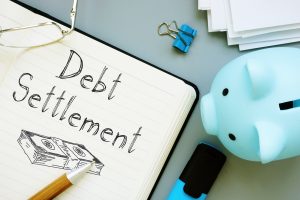Facing large amounts of credit card, medical, or other unsecured debt can feel overwhelming and even hopeless. You may struggle to keep up with minimum monthly payments and watch balances grow ever higher. Debt settlement has become an increasingly popular option for consumers in these difficult situations to resolve what they owe at a more manageable cost.

While debt settlement may seem like an easy fix, it comes with significant risks and drawbacks. Entering into settlement negotiations or agreements without fully understanding the process and implications can do even further damage to your finances and credit. Indeed, educating yourself on how debt settlement works, key steps, and pros and cons is critical.
Luckily, this guide will walk you through the debt settlement process, disadvantages of debt review, and so on to empower you to make informed decisions. Read on to learn more.
What’s Debt Settlement And How Does It Work
Debt settlement is an agreement between a creditor or debt collector and someone who owes unsecured debt. The creditor agrees to allow the borrower to pay a lump sum that is less than the total balance owed, and the account is considered settled.
Creditors are often willing to accept a reduced payoff because they want to recoup at least some of what they’re owed when a debtor is in financial hardship. Settling for a lower amount allows them to resolve debts owed and close accounts instead of making little or no progress collecting on the full balances. Nonetheless, any forgiven debt may count as taxable income.
Consumers have two main options for pursuing debt settlement:
- Hiring A Debt Settlement Company: Companies have relationships with creditors and experience negotiating settlements. They will handle communications and agreements in return for fees of the enrolled debt.
- Do-it-yourself (DIY) Settlement With Creditors: You can contact creditors yourself and propose settlements. This avoids settlement fees but requires more time and skill navigating discussions.
Regardless of whether you work with a company or not, debt settlement will likely have a negative impact on your credit score that can last several years even after debts are resolved.
When Debt Settlement Makes Sense As A Debt Relief Option
Debt settlement programs are best suited for consumers facing the following circumstances:
- Have thousands of dollars in unsecured debt such as credit cards, medical bills, personal loans or utility bills;
- Are unable to make minimum payments and maintain balances each month;
- Have experienced a financial hardship like job loss, reduced income, divorce or medical crisis;
- Have non-essential assets or lump sums like tax refunds to contribute to settlements; and the like.
Debt settlement usually only makes sense once you’ve fallen behind on payments and creditors have written off your accounts as unlikely to be repaid in full. If you have assets creditors could seize, like home equity or vehicles, then bankruptcy may be a better option.
Do You Qualify For Debt Settlement

The first step is taking a close look at your overall financial situation to determine if debt settlement may be a viable debt relief option.
Then, calculate your total disposable income after covering essential living expenses. This gives you an idea of what amount you could reasonably afford to contribute toward monthly settlement payments.
Getting your hands on a lump-sum through a loan from family or friends, tapping into your property’s equity, or even taking a hardship 401K withdrawal can make settlements more feasible. Just beware of adding further debt.
Do thorough research into debt settlement companies before choosing one; legitimate firms will provide free consultations to discuss your debt, assets and budget to advise if their programs are a fit. Reputable companies will also be transparent about fees and your legal rights in the process.
Advantages of working with debt settlement companies performing debt review services include convenience, high success rates, and so on. On the other hand, some of the drawbacks of debt review include possible negative impact on credit scores, limited credit access, and the like.
Initiating Contact With Creditors To Propose Debt Settlements
Once determining debt settlement could work for your situation, you or your settlement firm will need to contact each of your creditors to explain your financial hardship and propose a settlement. This process takes patience and negotiation know-how. Expect it to take several months to come to agreements with all creditors.
Create a list of all unsecured debts ranked by amount owed from largest to smallest. It’s strategic to start settlement discussions with your largest debt first, as that creditor has the most incentive to reach an agreement. A successful settlement can create momentum and goodwill to negotiate remaining debts.
Draft a hardship letter clearly explaining your circumstances and desire to settle accounts. Provide evidence of income loss, medical bills or other relevant documentation.
Then, propose an amount you can afford – be reasonable with your proposal. If the initial offer is rejected, be prepared to provide evidence of your budget and negotiate.
Get any tentative settlement offers in writing before sending payment. Reputable debt settlement firms will ensure agreements are binding and will hold creditors accountable down the road.
To Conclude
Although debt settlement can help you resolve unmanageable debt, inherent risks are present as well. Take time to understand the process and evaluate all your debt relief options. Then, consult reputable sources like credit counselors or financial advisors for guidance. Finally, weigh the pros and cons thoroughly before moving forward with settlement agreements.
You’ve got this! With patience and commitment to change, you can overcome debt through smartly done debt settlement.




Leave a Reply